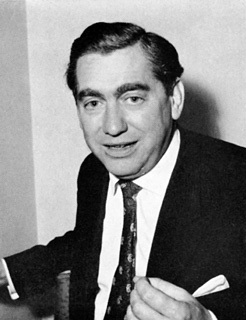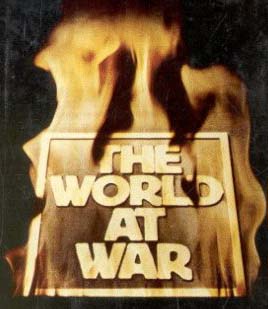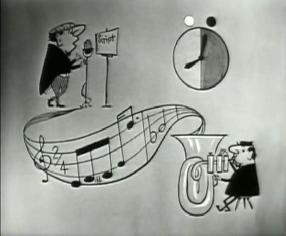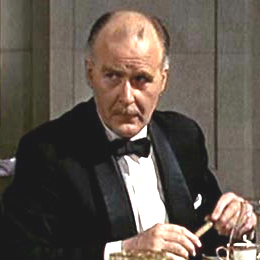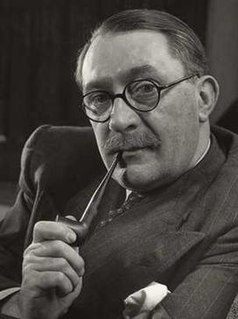Reshowing of episodes
Episodes of the original Face to Face were shown frequently on BBC Knowledge and still turn up occasionally on its successor BBC Four, especially during seasons such as The Lost Decade in October 2005. 30 of the original 35 episodes have been repeated, the exceptions being Nubar Gulbenkian, Roy Welensky, General Von Senger, Victor Gollancz and Danny Blanchflower. The soundtrack of the interview with Stirling Moss was issued on the 'B' side of an LP which also featured the soundtrack of the interview with Hancock. The BBC issued the original programme in a Region 2 DVD boxset in September 2009, complete apart from the interview with Albert Finney. The BBC has put up an online archive of selected programmes. [8]
List of subjects
Original programme (1959–1962)
- Lord Birkett – 4 February 1959
- Bertrand Russell – 4 March 1959 [9]
- Dame Edith Sitwell – 6 May 1959 [10]
- Lord Boothby – 27 May 1959
- Nubar Gulbenkian – 15 July 1959
- Adlai Stevenson – 22 July 1959
- John Huston – 1 September 1959
- Carl Gustav Jung – 22 October 1959 [11]
- Lord Morrison of Lambeth – 18 December 1959
- King Hussein of Jordan – 1 January 1960
- Lord Shawcross – 10 January 1960
- Tony Hancock – 7 February 1960
- Henry Moore – 21 February 1960
- Dr Hastings Banda – 22 April 1960
- Augustus John – 15 May 1960
- Sir Roy Welensky – 29 May 1960
- Stirling Moss – 12 June 1960 [12]
- Evelyn Waugh – 26 June 1960 [13]
- Gilbert Harding – 18 September 1960
- General Von Senger – 2 October 1960
- Lord Reith – 30 October 1960
- Simone Signoret – 13 November 1960
- Victor Gollancz – 27 November 1960
- Adam Faith – 11 December 1960 [14]
- Otto Klemperer – 8 January 1961
- Frank Cousins – 15 October 1961
- Rev Dr Martin Luther King Jr. – 29 October 1961 [15]
- Lord Hailsham – 12 November 1961
- Jomo Kenyatta – 26 November 1961
- Sir Compton Mackenzie – 7 January 1962
- John Osborne – 21 January 1962
- Roy Thomson, 1st Baron Thomson of Fleet – 4 February 1962
- Cecil Beaton – 18 February 1962
- Albert Finney – 4 March 1962
- Danny Blanchflower – 18 March 1962
Revival (1989–1998)
- Anthony Burgess – 21 March 1989
- Merce Cunningham – 5 April 1989
- David Hare – 16 May 1989
- George Steiner – 31 May 1989
- Bernardo Bertolucci – 26 September 1989
- J.G. Ballard – 7 November 1989
- Oliver Sacks – 24 January 1990
- Claire Bloom – 15 February 1990
- James Fenton – 20 March 1990
- Roger Corman – 24 May 1990
- Oliver Stone – 11 September 1990
- Hans Eysenck – 16 October 1990
- Edmund White – 20 November 1990
- David Attenborough – 21 January 1991
- Vanessa Redgrave – 26 September 1991
- Norman Stone – 15 October 1991
- Jessye Norman – 10 February 1992
- Steven Berkoff – 21 May 1992
- Rod Steiger – 16 September 1992
- Susan Sontag – 10 November 1992
- John Schlesinger – 8 February 1993
- Derek Jarman – 15 March 1993
- Jonathan Miller – 12 May 1993
- Peter Hall – 23 September 1993
- Martin Amis – 25 October 1993
- David Hockney – 10 November 1993
- Kirk Douglas – 13 December 1993
- Joseph Heller – 17 January 1994
- Steven Spielberg – 31 January 1994
- Billy Connolly – 28 February 1994
- V.S. Naipaul – 16 May 1994
- Maya Angelou – 6 June 1994
- Jeanette Winterson – 20 June 1994
- Ken Loach – 19 September 1994
- Salman Rushdie – 19 October 1994
- Allen Ginsberg – 9 January 1995
- Arthur Miller – 13 February 1995
- Ken Dodd – 13 March 1995
- Lauren Bacall – 20 March 1995
- Anthony Hopkins – 18 September 1995
- John Berger – 2 October 1995
- Stephen Sondheim – 9 October 1995
- Martha Gellhorn – 16 October 1995
- Norman Mailer – 23 October 1995
- Paul Eddington – 30 October 1995
- Germaine Greer – 6 November 1995
- Harold Pinter – 21 January 1997
- Kate Adie – 28 January 1997
- Alan Parker – 4 February 1997
- Roddy Doyle – 11 February 1997
- Diana Rigg – 18 February 1997
- Bob Monkhouse – 25 February 1997
- Denis Forman – 13 October 1997
- Ben Elton – 12 January 1998
- Ian McKellen – 19 January 1998
- Joan Baez – 26 January 1998
- Martin Bell – 9 February 1998
- Yoko Ono – 16 February 1998
- David Mamet – 23 February 1998
- Jeremy Isaacs – 14 September 1998
